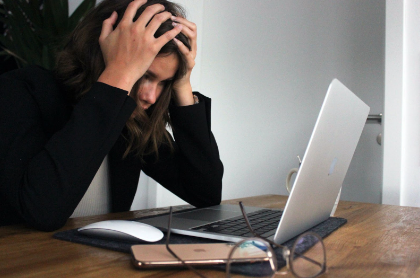
If you’ve reached the end of your mental rope lately, you’re not alone. You might be thinking to yourself: I worked more than forty hours per week before the pandemic, and the kids had a million activities to get to, and I was caring for my mother, and, and, and… Perhaps you’ve been home more lately. Perhaps your company was able to facilitate you working from home. Maybe your kids’ extracurriculars haven’t started up again. Maybe you feel like you “do less” these days, so you tell yourself you can’t possibly be burned out!
The truth is that burnout is a state of mental, emotional, and physical exhaustion caused by stress. And if we’ve been anything for the past fifteen months, it’s stressed.
There has definitely been an increase in burnout due to spending so many months in a stressed-out state while coping with the pandemic. On top of the day-to-day tasks and chores to get done has been adjusting to different live-work-school situations and an additional level of stress caused by uncertainty and fear. It doesn’t matter if your life and your world seemingly got smaller and less busy; you were coping mentally and emotionally with the unprecedented times you lived through!
Many people only relate burnout with their work situations, but you can experience burnout in your overall life as well. A lack of clarity and/or control about a situation can cause

burnout, as can a lack of social support. Dysfunctional workplace dynamics and work-life imbalance can contribute to workplace burnout, which can spill over into your entire life.
Unfortunately, many of us experience occupational burnout as a custom of our culture. We mistakenly believe that we must toil and labor to achieve success and that people around us must see these great efforts to appreciate our achievements. But just because we are working harder doesn’t mean we are working smarter. The “pride” we take in being over-extended, strapped for time, and tired is a cultural phenomenon that makes perfect sense in Woodland Hills but less sense around the globe, where work-life balance is expected, and rests and breaks are the norm.
Because being over-extended is in the fabric of our culture, it can be hard to recognize burnout. You may have been operating at a burned-out level for so long that it just feels normal. Or perhaps burnout is new to you; you’ve felt an increasing sense of fatigue since the onset of the pandemic that you can’t quite define. If you’re feeling tired and wondering if you’re burned out, you probably are!
5 Signs of Burnout:
- Increase in physical and somatic complaints and symptoms:
Tension and stress often manifest as physical discomfort. Our bodies’ three-day headache or persistent digestive problems are attempts to tell us that they are in distress. Some people even experience a dull, ever-present headache that no amount of hydration, rest, or massage seems to alleviate. A churning stomach can lead to feelings of nausea; it can also give you heartburn or send you rushing to the bathroom more throughout the day. There is a mind and body connection where your mental distress can lead to physical somatic symptoms and complaints.
- Emotional dysregulation:

You might be noticing changes in your emotional state that interfere with your daily tasks and responsibilities. Perhaps you are experiencing emotions in an extreme intensity; feelings like anxiety or irritability are becoming your new normal. Burnout can lead to impulsivity, reactivity, rage, and impatience. When you are in the throes of emotional dysregulation, you may find yourself lashing out at loved ones or those who happen to be nearest to you. This adds to the stress and the anxiety; you feel terrible for what you said or how you said it. You stay up late, going over how bad you feel and how much you regret what happened, further exacerbating your problem by reducing your sleep. The emotional rollercoaster usually brings you to the point of such frustration that you say, “I am so burned out. I can’t go on like this!”
- Decrease in socialization or lack of interest in pleasurable activities:
This may seem like a no-brainer, but it can creep upon us. We might tell ourselves we are too tired or too busy to participate in a picnic with friends when in actuality, we are resisting the work of putting on a brave face for our loved ones. We may think about an activity we know we enjoy, such as cycling, but feel zero inclination to take our bike out for a spin. Even if we are conscious that we “should” want to do something, we lack the motivation to do it.
- Sleep problems:
Complete exhaustion does not necessarily mean that we will fall asleep faster or sleep longer. We tend to think, “If I just get tired enough, I will sleep like a baby.” But research has shown that missing our window for sleep and staying up too late makes it harder to fall asleep. This creates an irregular sleep pattern that impedes the quality and/or duration of our sleep. Over-exhaustion and anxiety are among the reasons that people struggle to experience quality sleep.
- Rumination and racing thoughts:
Do you find it hard to control your thoughts? Perhaps you recognize that something you are thinking about or focused on isn’t serving you, but you can’t seem to let it go. Does your mind feel like it is always racing? You may feel like you’re thinking several things at once or that your thoughts are “rushed” or jumbled. Is there

always something to worry about? This can be especially upsetting when tasks and goals are achieved at the end of the day, and in a quiet moment to yourself, you’re unable to relax and enjoy yourself because you are worrying. You may experience persistent unhealthy thoughts such as, “My worthiness is measured by my productivity.” Dealing with rumination can feel like an endless battle because you never get to walk away from your mind.
Burnout is not a badge of honor, despite the glorification of it in our culture. It has long-term mental and physical effects, including symptoms of depression, chronic fatigue, susceptibility to cold and flu, and more. The fact that we have been dealing with a pandemic for more than a year is beyond our control, but we can develop and nurture skills to help us manage the fallout from this event. As time goes by, these are great skills to maintain to prevent burnout in standard situations.
5 Skills to Cope with Burnout:
- Reorganize your schedule:

The way you feel won’t change if you don’t change your actions. Even if this measure is only temporary until you feel a little more rested, it is important to figure out where you are spending too much of your energy and try to alleviate that burden for yourself.
Start with your daily to-do list. Delegate tasks, ask for help and say no to new requests. Focus on prioritizing. One of the most important things I tell my clients to ask themselves at the beginning of every day is: what is most important today? Because if everything is important, then nothing is important.
Focus on setting boundaries as you take on this task. This begins with setting boundaries with yourself and sticking to them as best and as often as you can. Saying no to what isn’t a priority and being clear about what is may mean the difference between getting the help you need or not. This doesn’t mean that you have to be aggressive or to demand with people; it means that you stand firm in your knowledge of your needs, and you honor them through communication.
- Make time for self-care and rest:

It is not enough that you do fewer things every day; it is also important that you engage in specific activities that bring you feelings of calmness and relaxation. You need to engage in activities that fill up your cup. A great way to do this is to assemble a “self-care box”; when you feel the need for self-care, the self-care box eliminates having to decide what to do to nurture yourself. It is already assembled, full of things that you know will help you feel better. Part of the fun is to choose a special container and location for this kit. Some examples of items you can keep stored for self-care time are a cozy blanket, a comfy robe, tea, and a motivational, pretty, or funny mug, a journal, a coloring book, nice pens and/or markers, body care products such as lotions and/or oils, aromatherapy, a snack you enjoy, your favorite scented candle, bubble bath, Epsom salts, a puzzle. The list is endless. You might even add something to the self-care kit that you forget about; coming across it when you need some R&R might be just the happy surprise to brighten your day!
- Create an evening routine to improve your sleep hygiene:

Many people struggle with sleep hygiene these days, as the blue light from our screens surrounds us, often right up until bedtime. It is an aspect of our society, with all of us on our digital devices for work and leisure purposes. We may also have fallen into unhealthy habits regarding carving out time for ourselves over the past fifteen months; most of us end up feeling restless at the end of an unfulfilling day and stay up later to try to “reclaim some time,” leading to later bedtimes and inconsistent sleep patterns. Unplugging before bedtime, limiting large meals or excessive alcohol right at bedtime, and waking up at the same time every day are just a few of the ways we can improve our sleep hygiene. There are a lot of reasons that people experience sleep problems, and also a lot of solutions.
- Learn new coping skills to address the symptoms of burnout:
Everyone experiences burnout differently. If your burnout has caused significant sleep impairment, focus on the above tool to improve your sleep hygiene. If burnout has caused an increase in reactivity and impulsivity, you need to focus on impulse control strategies. If you are experiencing rumination, focus on worry time or journaling. If you are experiencing anxiety, look into meditation or yoga. The new coping skills you learn need to directly address the specific symptoms you deal with. If you are dealing with more than one symptom, you may find it most helpful first to tackle the most disruptive one. You may also find it helpful to make small changes regarding each symptom, starting with the easiest or simplest to implement.
- Talk to a therapist:
You need to take your burnout symptoms seriously and make immediate changes. When everyone around us is tired or struggling, it can be challenging to prioritize ourselves. We can also fall into the habit of telling ourselves that we “can handle it” or “handle it better than otherscan.” But if your burnout symptoms are interfering with your life, that is enough of a reason to seek help and begin to work through your struggle. You don’t need to wait until you have a nervous breakdown to get help!

It would be simple to say that as life returns to “normal” following the pandemic, we will feel less stressed and, therefore, more rested. But this will not be the case for many of us. As we process more than a year of our lives, we will face issues that we moved to the back burner. Maybe we had to move them there because pandemic restrictions made them impossible, or maybe because we simply didn’t have the mental and emotional space to deal with them at the time. We might find that transitioning back to the way we lived before presents a new kind of burnout. Maybe we’d like to work from home a couple of days per week. Maybe we always hated our commute. Maybe we are eager to return to the office, but not eager to be micromanaged. Perhaps we missed some people and appreciated the “permission” we were given to say “no” to social gatherings over the past year.
As you navigate your new path forward, do your best to advocate for yourself and support yourself in avoiding burnout in advance, where possible. Understand that becoming overwhelmed happens in all stages of life and that you have permission to step back from something that isn’t serving you. Don’t belittle your needs with thoughts comparing your situation to one of life-or-death. Take it one move, one obstacle, one task at a time.
Embracing You Therapy Group Practice
Here at Embracing You Therapy, we invite you to explore with us how life would be different if you had more control over your thoughts and emotions, and we invite you to consider that it is possible to accept things just as they are, embracing imperfections to create a gentler place for calm in your life.
Let’s learn what drives your unique perspective on anxiety and stress. Then, let’s find the tools-your unique tools-that help you respond to life in a healthy, calm way. Contact us today for your complimentary 15-minute phone consultation with one of our Client Care Coordinators.





